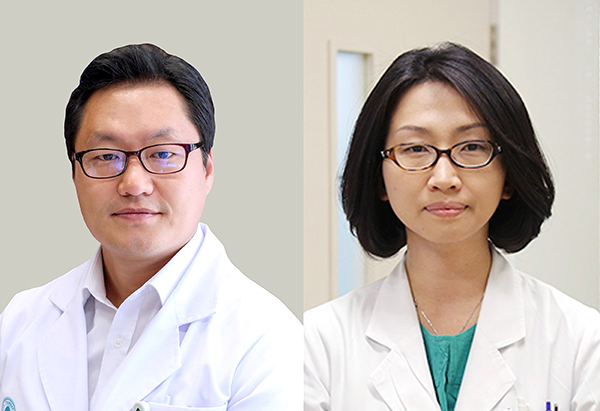-
- Global AMC MENU
- NEWS
- HEALTH
- PEOPLE
- Introduction

▲(from the left) Professor Jun Ki Kim from the Department of Convergence Medicine and Professor Soo-Jin Kang from the Division of Cardiology
The research team at Asan Medical Center, led by Professor Jun Ki Kim from the Department of Convergence Medicine and Professor Soo-Jin Kang from the Division of Cardiology, has developed a diagnostic technology capable of determining the severity of arteriosclerosis using just a single drop of blood. This breakthrough is of great significance as it introduces a standardized approach to classifying and responding to the risk of arteriosclerosis for the first time.
To achieve this advancement, the research team employed label-free surface-enhanced Raman spectroscopy (SERS), a technique that greatly amplifies Raman spectroscopic signals by leveraging the plasmon resonance of rough-surfaced metals. In their experiments, a portion of the left carotid artery in genetically engineered mice lacking lipase-activating apolipoprotein E was surgically ligated to induce atherosclerosis. The presence of arteriosclerosis was confirmed through small animal magnetic resonance imaging (MRI) and immunohistochemical staining. Raman signals were then obtained by placing a 5uL droplet of blood collected from mice with mild and severe arteriosclerosis, as well as the control group, on SERS chips specifically designed for nano-biomarker detection.
By combining principal component analysis (PCA) with partial least squares regression-discriminant analysis (PLS-DA) mechanism, the research team sequentially derived vectors connecting the control group and the mild and severe disease groups within the principal component space of the Raman spectrum. Moreover, they verified the grouping of data from the disease groups along these vectors and identified peak values in the Raman spectra that contributed to this grouping. The peaks utilized in the study were associated with cholesterol esters and atherosclerotic lipids, which are closely linked to the development of arteriosclerosis. Furthermore, through the application of AI technology, the team achieved diagnostic accuracy rates of 94.5% for PCA-based diagnosis and 97.5% for PLS-DA.
This research received support from the Ministry of Health and Welfare and the Ministry of Science and ICT. The research findings were recently published in ‘Bioengineering & Translational Medicine,’ a prestigious academic journal specializing in engineering and biomedicine.












